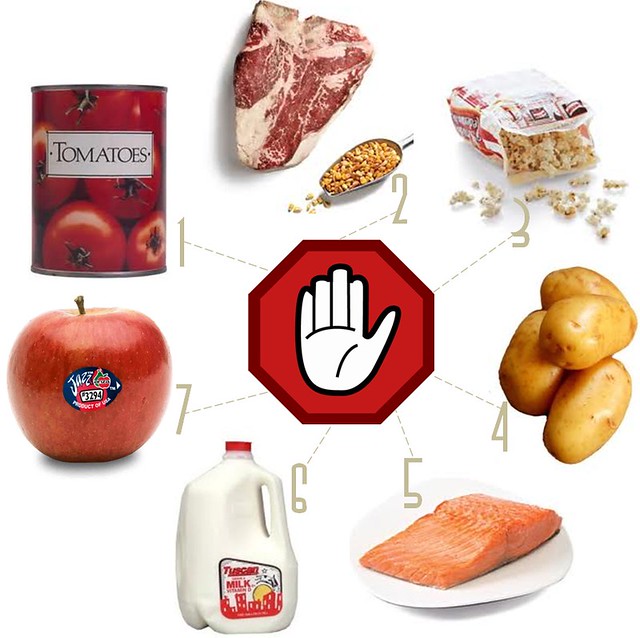As you know I've been working towards eating more clean, and that means choosing fruits, vegetables, and meats that are raised, grown, and sold with minimal processing. Often they’re organic, and rarely (if ever) should they contain additives. But in some cases, the methods of today’s food producers are neither clean nor sustainable. The result is damage to our health, the environment, or both. I'm pretty solid on what foods I should be eating, and just recently researched foods that I need to avoid and this is what I found:
1. Canned Tomatoes
The problem: The resin linings of tin cans contain bisphenol-A, a synthetic estrogen that has been linked to ailments ranging from reproductive problems to heart disease, diabetes, and obesity. Unfortunately, acidity (a prominent characteristic of tomatoes) causes BPA to leach into your food. Studies show that the BPA in most people's body exceeds the amount that suppresses sperm production or causes chromosomal damage to the eggs of animals.
The solution: Choose tomatoes in glass bottles (which do not need resin linings), or Tetra Pak boxes available at Trader Joe's
2. Corn-Fed Beef
The problem: Cattle evolved to eat grass, not grains. But farmers today feed their animals corn and soybeans, which fatten up the animals faster for slaughter. More money for cattle farmers (and lower prices at the grocery store) means a lot less nutrition for us.
The solution: Buy grass-fed beef, which can be found at specialty grocers, farmers' markets, and nationally at Whole Foods. It's usually labeled because it demands a premium, but if you don't see it, ask your butcher.
3. Microwave Popcorn
The problem: Chemicals, including perfluorooctanoic acid (PFOA), in the lining of the bag, are part of a class of compounds that may be linked to infertility in humans, according to a recent study from UCLA. In animal testing, the chemicals cause liver, testicular, and pancreatic cancer. Studies show that microwaving causes the chemicals to vaporize-and migrate into your popcorn.
The solution: Pop natural kernels the old-fashioned way: in a skillet. For flavorings, you can add real butter or dried seasonings.
4. Non-organic Potatoes
The problem: Root vegetables absorb herbicides, pesticides, and fungicides that wind up in soil. In the case of potatoes-the nation's most popular vegetable -they're treated with fungicides during the growing season, then sprayed with herbicides to kill off the fibrous vines before harvesting. After they're dug up, the potatoes are treated yet again to prevent them from sprouting. Try this experiment: Buy a conventional potato in a store, and try to get it to sprout. It won't.
The solution: Buy organic potatoes. Washing isn't good enough if you're trying to remove chemicals that have been absorbed into the flesh.
5. Farmed Salmon
The problem: Nature didn't intend for salmon to be crammed into pens and fed soy, poultry litter, and hydrolyzed chicken feathers. As a result, farmed salmon is lower in vitamin D and higher in contaminants, including carcinogens, PCBs, brominated flame retardants, and pesticides such as dioxin and DDT. You can only safely eat one of these salmon dinners every 5 months without increasing your risk of cancer. Preliminary science has also linked DDT to diabetes and obesity, but some nutritionists believe the benefits of omega-3s outweigh the risks. There is also concern about the high level of antibiotics and pesticides used to treat these fish. When you eat farmed salmon, you get dosed with the same drugs and chemicals.
The solution: Switch to wild-caught Alaska salmon. If the package says fresh Atlantic, it's farmed. There are no commercial fisheries left for wild Atlantic salmon.
6. Milk Produced with Artificial Hormones
The problem: Milk producers treat their dairy cattle with recombinant bovine growth hormone (rBGH or rBST, as it is also known) to boost milk production. But rBGH also increases udder infections and even pus in the milk. It also leads to higher levels of a hormone called insulin-like growth factor in milk. In people, high levels of IGF-1 may contribute to breast, prostate, and colon cancers.
The solution: Check labels for rBGH-free, rBST-free, produced without artificial hormones, or organic milk. These phrases indicate rBGH-free products.
7. Conventional Apples
The problem: If fall fruits held a "most doused in pesticides contest," apples would win. Why? They are individually grafted (descended from a single tree) so that each variety maintains its distinctive flavor. As such, apples don't develop resistance to pests and are sprayed frequently. The industry maintains that these residues are not harmful. But experts counter that it's just common sense to minimize exposure by avoiding the most doused produce, like apples. Farm workers have higher rates of many cancers, and increasing numbers of studies are starting to link a higher body burden of pesticides (from all sources) with Parkinson's disease.
The solution: Buy organic apples. If you can't afford organic, be sure to wash and peel them first.
Just a little food for thought...



No comments:
Post a Comment
Thank you for your comment! Whether you agree with the opinions found on this blog or not, your voice is important to other readers who share this space. Constructive criticism can be useful if left in a tone meant to help and not to shock or overly offend. However, six eighty eight reserves the right to delete any comment that is abusive, profane, rude, or considered spam.